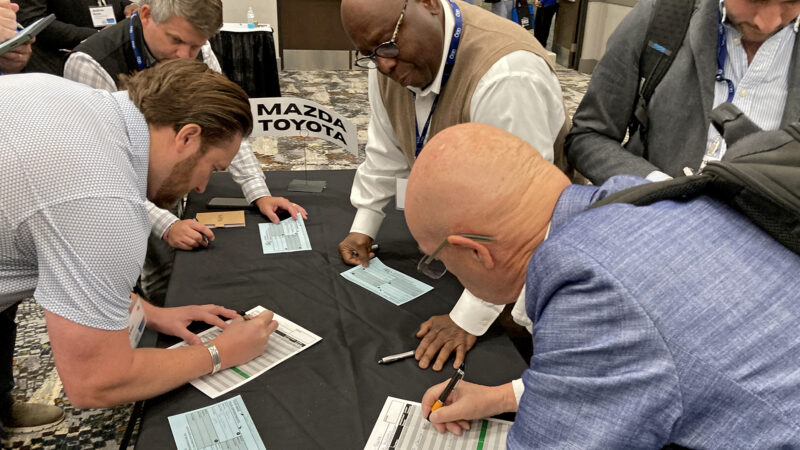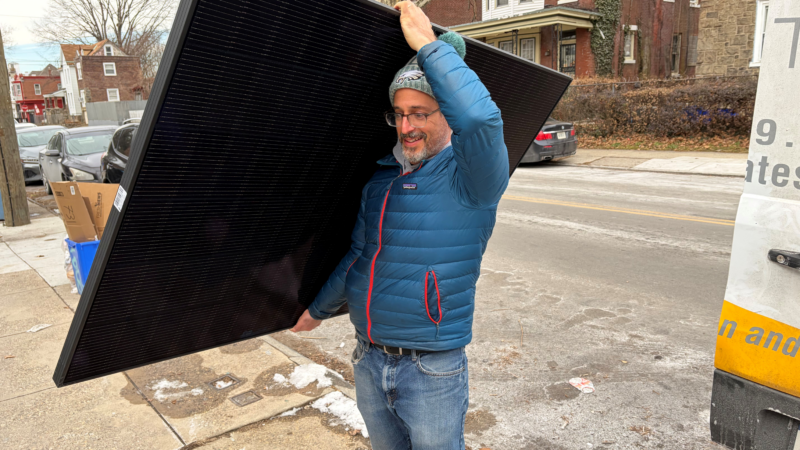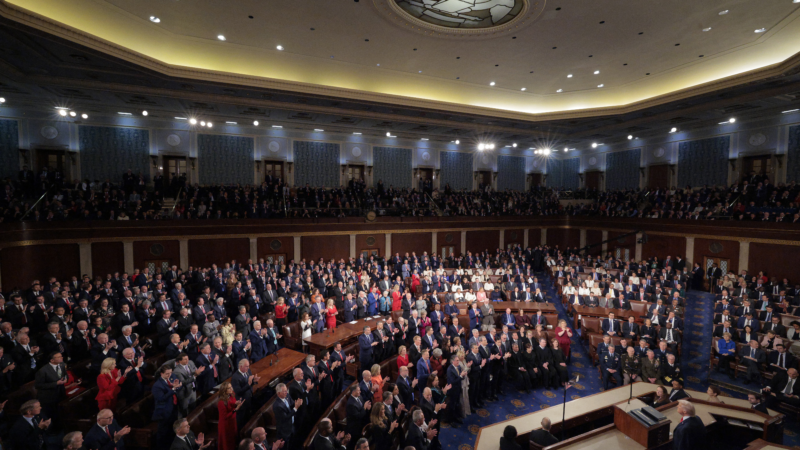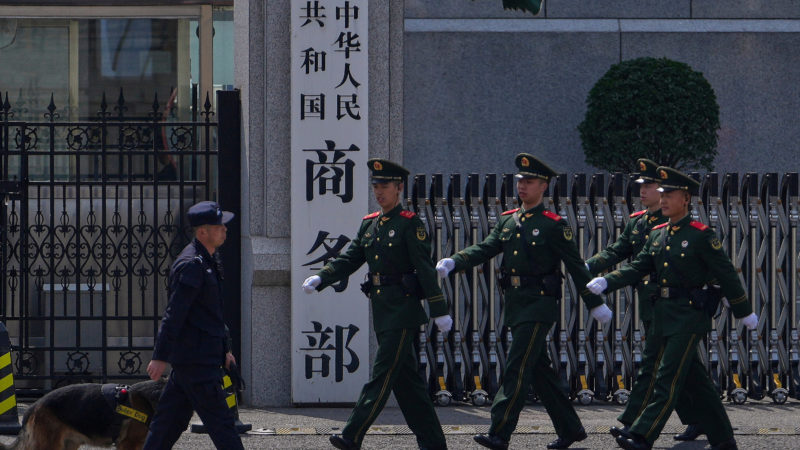Amid tariff costs, a ‘speed dating’ event helps connect Southern auto suppliers, makers
Sellers sign up for five-minute meetings with a representative from the Mazda-Toyota plants in Alabama at the Southern Automotive Conference in Huntsville, Alabama, on October 7, 2025.
The ballrooms in the Von Braun Center in Huntsville, Alabama, aren’t exactly romantic. Think fluorescent lights, gray conference room dividers and loud, with more than 180 salespeople making their pitches.
But for 13 years, the Southern Automotive Conference has held this matchmaking event to help kindle sparks between manufacturers and suppliers in the South’s booming auto industry with a speed dating spin.
U.S. companies get the full attention of household names like Hyundai and Mazda to pitch them on a partnership — at least until the buzzer signals them to move on to the next “date.” It’s three hours of handshakes, business card swaps and industry jargon you’d expect at a conference networking night, packed into five-minute chunks.
“The traditional trade show model, you spend a lot of time talking to the wrong people,” Jack Grace, director of sales at Landrum Workforce Solutions, said. “Having this environment where it’s very distilled, albeit a little chaotic, is really interesting.”
Here are three takeaways from the matchmaking, car-building scene.
Tariffs have carmakers looking at American companies with open eyes
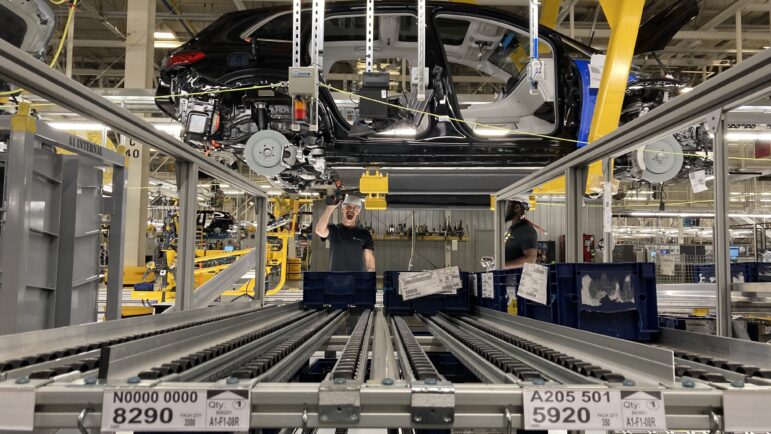
Foreign car makers, like Mercedes-Benz from Germany and Honda from Japan, dominate the American South’s auto industry. Alabama alone has four major assembly plants, and the auto sector employs about 54,000 Alabamians.
And more jobs could come due to President Donald Trump’s 25% tariffs on cars and auto parts, along with even higher tariffs on some materials, which have carmakers reconsidering their supply chains.
“I have a ton of customers that are moving tools back from overseas,” Courtney Bowling, an account manager with Stratosphere Quality, said while waiting to sign up for a meeting with Volkswagen. “It’s more jobs for American workers, and I love that.”
Of course, it’s also American companies feeling the financial pain. Baxter Enterprises, a Tennessee supplier of tools and finished parts for companies like Mercedes and BMW, has seen prices go up on the materials it imports from overseas. Some metal clips and components have gone up 50%, which is why Baxter had a table at the event to find U.S. suppliers.
The Mazda-Toyota factory in Alabama also had a spot to check out the local supply scene.
“We’re looking for ways that we can save money with tariffs being what they are,” Marlena Mellenthin, a procurement specialist at the plant, said. “We’re just open to whatever is out there.”
Companies aren’t rushing supply chain changes yet
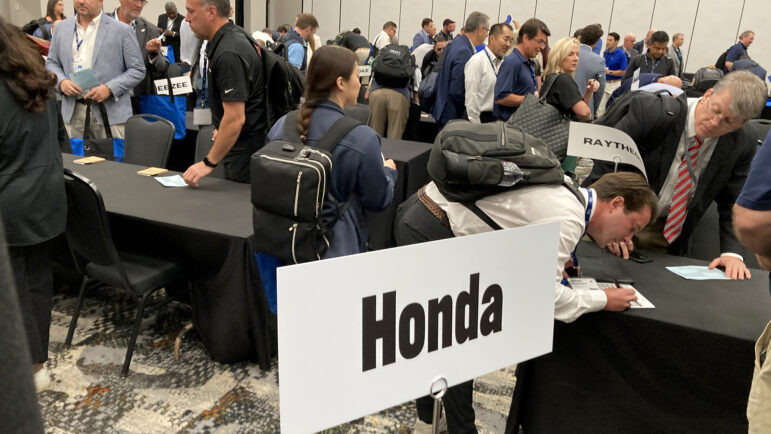
While Mellenthin said Mazda-Toyota is open to finding better services and pricing, the plant already has sources for most of what it needs to continue operations, even with the new tariffs.
Ultimately, becoming the newest link on a car maker’s long, complex and well-established supply chain isn’t easy, even with the tariff incentive. The point of participating in the manufacturing speed dating rounds is to quicken this still long courtship, according to the matchmaking event’s founder, Jean Marie Thrower.
“It takes years to get your parts on a car,” Thrower, who’s also president of Supplier Development Systems, said.
Companies are also finding ways to manage tariffs without shifting fully to U.S. suppliers. During a panel at the conference, the head of Honda’s Alabama plant, Lamar Whitaker, said the company is not making drastic changes by relocating manufacturing stateside. Plus, the company already has a robust supply chain in the country.
Instead, Honda’s moving production around in its North American factories. The ones in the U.S. are now more about building cars for the American consumer, rather than exporting to sell elsewhere. That role moved to the company’s Canadian factory.
A handshake and personality still matter for making a sale
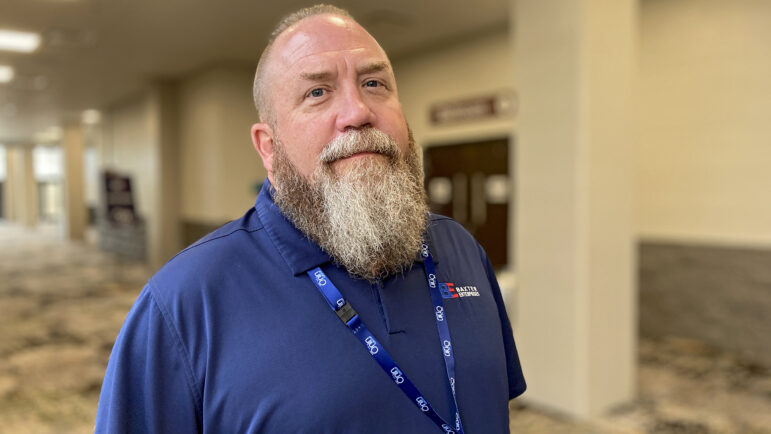
Saving money, primarily by avoiding tariffs, might have been the main motivation for buyers at the event, but they were not just looking for the lowest bidder.
At least not Doug Drake, the materials manager at Baxter Enterprises, who manned the company table. He could have met many of these suppliers through a Google search and a video call, but he wanted to be able to shake hands and meet face-to-face.
To him, personality matters in the manufacturing world, and some attitudes he doesn’t get along with.
“They can be a real pushy salesperson,” Drake said. “Most of the time I don’t care for that.”
For the salespeople, they’re here to avoid wasting time hunting a conference floor just to find a company rep without any purchasing power. Grace, of Landrum Workforce Solutions, said that while the match-making is nerve-racking, the five minutes of face time is worth it.
“This is gold as far as I’m concerned,” Grace said.
This story was produced by the Gulf States Newsroom, a collaboration between Mississippi Public Broadcasting, WBHM in Alabama, WWNO and WRKF in Louisiana and NPR.
When a horse whinnies, there’s more than meets the ear
A new study finds that horse whinnies are made of both a high and a low frequency, generated by different parts of the vocal tract. The two-tone sound may help horses convey more complex information.
Trump’s many tariff tools mean consumer prices won’t go down, analysts say
The Supreme Court struck down President Trump's signature tariffs. But the president has other tariff tools, and consumers shouldn't expect cheaper prices anytime soon, economists say.
Hundreds of American nurses choose Canada over the U.S. under Trump
More than 1,000 American nurses have successfully applied for licensure in British Columbia since April, a massive increase over prior years.
Tax credits for solar panels are available, but the catch is you can’t own them
Rooftop solar installers are steering customers toward leases instead of purchases. Federal tax credits for purchased systems have ended but are still available for leased ones.
5 takeaways from Trump’s State of the Union address
President Trump hit familiar notes on immigration and culture in his speech Tuesday night, but he largely underplayed the economic problems that voters say they are most concerned about.
China restricts exports to 40 Japanese entities with ties to military
China on Tuesday restricted exports to 40 Japanese entities it says are contributing to Japan's "remilitarization," in the latest escalation of tensions with Tokyo.

